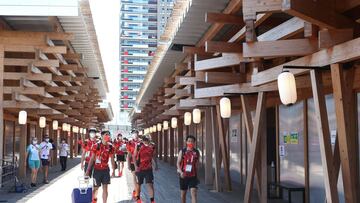The Olympic Village at Tokyo 2020: Restrictions, PCRs, cardboard beds...
With 18,000 athletes, coaches and officials expected to arrive the organisers of the huge Tokyo Bay complex have made some changes to ensure it remains covid-safe.


After a one-year delay the 2020 Olympics will be going ahead in Tokyo, Japan but the global festival of sport will be unlike any in the competition’s illustrious history.
The games will begin on 23 July with nations from around the world coming together in Tokyo Bay, but with the host nation’s covid-19 case numbers spiralling local authorities have instituted a number of changes to ensure that athletes, officials and spectators are kept safe throughout.
Restrictions in place to reduce the risk of infection
Every four years a new Olympic Village is introduced to house the thousands of athletes competing in the games’ myriad events. This year the festival-like vibe will be dampened slightly with mandatory face masks everywhere in the village, only to be taken off while sleeping and eating.
Each seat in the site’s huge 3,000-person canteen will be cordoned off with a plexiglass screen to avoid the change of contagion while eating, and an app will allow people to check how crowded communal areas are before entering.
Olympic Village Plaza😍👌 pic.twitter.com/dmVzUKBpbX
— Sathiyan Gnanasekaran OLY (@sathiyantt) July 20, 2021
Another key feature for the athletes will be the purpose-built gym, which boasts 600 cardio and weight-training machines. Masks will be mandatory while working out with all equipment cleaned and disinfected regularly.
Those competing in the games will not be allowed to leave the village unless travelling to a competition or training venues. Alcohol consumption is forbidden in groups and in public areas, but there is a recreation centre on hand with Nintendo consoles and places to relax. Organisers have warned that violation of any of these rules will be punished, and disqualification from the competition is a possibility.
Daily testing will be a reality for Olympians
Before heading down for breakfast each morning all 18,000 residents (athletes, coaches and officials) will have to complete a daily coronavirus test. The regular testing will be a simple self-administered saliva antigen test, which will then be submitted for processing.
📍olympic village pic.twitter.com/pA65aLOyPj
— Simone Biles (@Simone_Biles) July 19, 2021
Anyone returning a positive result will then have complete a more accurate PCR test. If this test also shows that the individual in positive for covid-19 then they will be relocated to the fever clinic, a small prefabricated building in the middle of the village.
A third test at the clinic is the final chance of salvation; if a third positive is returned then they will be out of the Olympic Games and a medic will determine whether isolation or hospitalisation is required.
Cardboard beds are not an ‘anti-intimacy’ ploy
One of the most talked about features of the Tokyo Bay Olympics village has been the unique beds that are fitted in each bedroom. Manufactured by Japanese company Airweave, the recyclable bed frames are made almost entirely out of renewable materials, such as cardboard.
Related stories
Paul Chelimo, an American distance runner, claimed on Twitter that the beds were only able to support a single person and so were “aimed at avoiding intimacy among athletes”. Others on social media soon picked up on the unusual bedding and christened the recycled structures “anti-sex beds.”
“Anti-sex” beds at the Olympics pic.twitter.com/2jnFm6mKcB
— Rhys Mcclenaghan (@McClenaghanRhys) July 18, 2021
However that theory was soon disproven by Irish gymnast Rhys McClenaghan who posted a video of himself proving that the beds could withstand vigorous activity. The 22-year-old showed himself jumping up and down on the beds to show that there is little danger of them collapsing; prompting the official Olympics Twitter account to reply: “Thanks for debunking the myth.”

